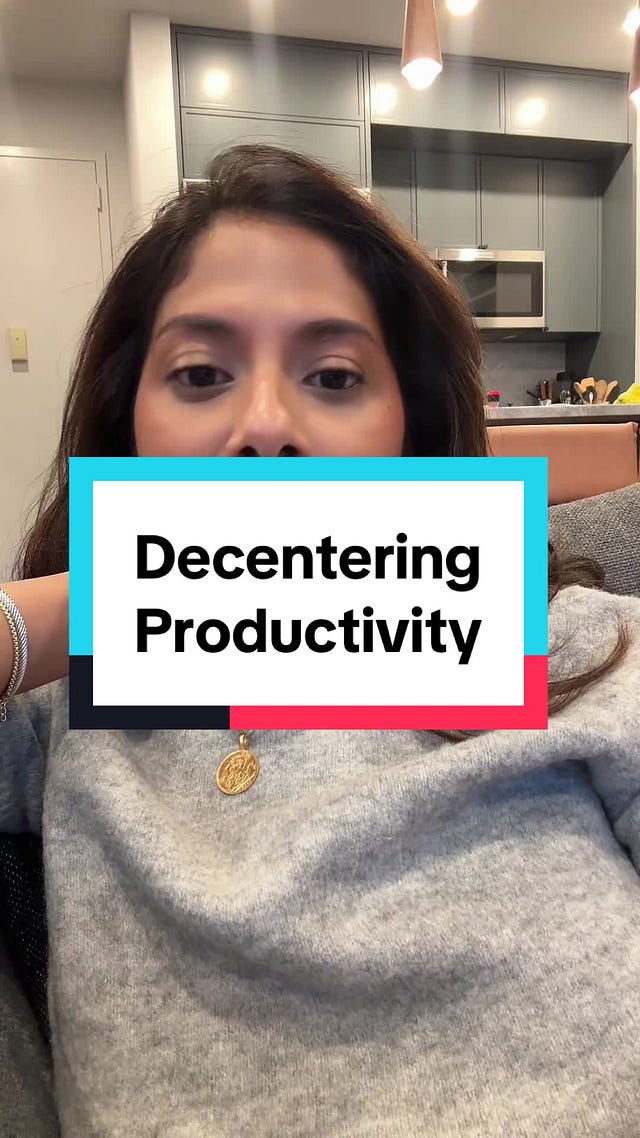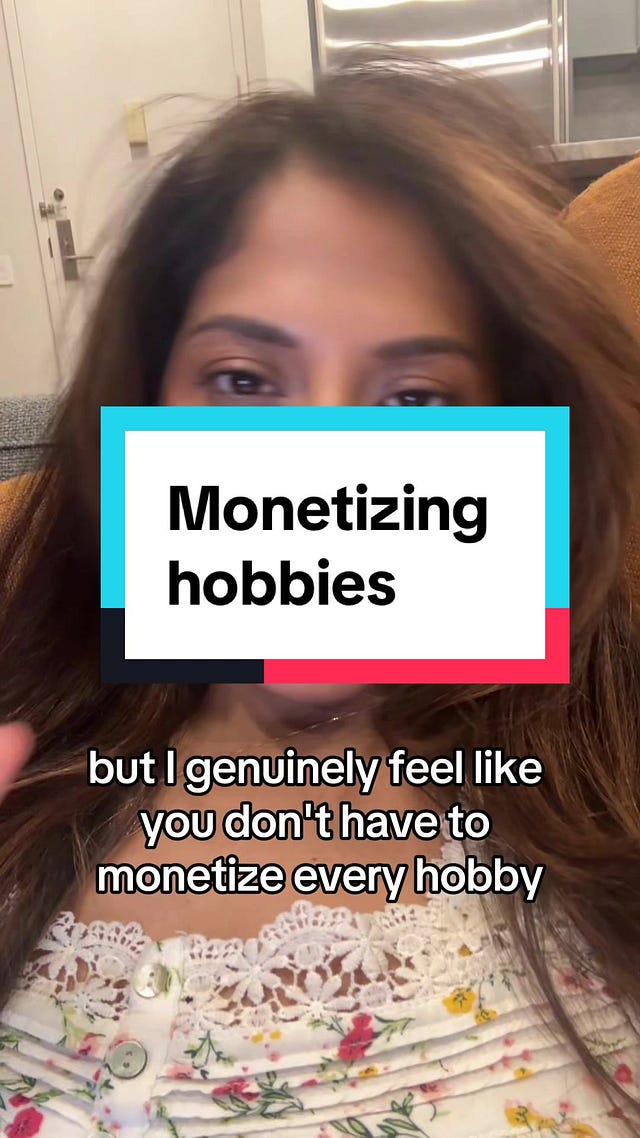My book, Toxic Productivity, is available for pre-order right now. Order before Nov 19th for two bonus chapters + worksheets + a 3 month subscription to this Substack newsletter.
If you’re in NYC on Nov 19th, come by the book launch party! Register your RSVP here.
“I can’t remember the last time I didn’t feel tired.”
A few years ago, this was probably the phrase I said most often. Looking back at myself at that time, I see someone pushing herself to keep doing more, single-mindedly chasing achievements. On the outside, I looked like someone that society would call successful: I was married, living in New York City, working in the rapidly rising field of digital health, going out to shows and plays in the evenings. Anyone would have assumed that I was thriving. But on the inside, all I could think was, You are not doing enough. You should have done more. Why aren’t you doing as well as others? And this was making me miserable.
Unsurprisingly, this time of my life was the most uncreative season - because I did not leave any time for me to engage with imagination, dreaming, letting my mind wander, being playful and tapping into flow state. Why? Because I had no hobbies.
Hobbies are activities you engage in for enjoyment, curiosity, or relaxation rather than for financial gain or external achievement. They’re pursuits that allow you to explore interests, cultivate skills, and find joy outside of obligations or productivity-driven tasks
One of the biggest barriers to engaging in hobbies is our attachment to success—the idea that everything we do must have a measurable outcome, whether it's skill mastery, recognition, or productivity. This mindset can turn hobbies into yet another task on the to-do list, stripping them of the very joy they’re meant to bring.
But hobbies aren’t about being good at something; they’re about being immersed in something. Redefine success by focusing on how the hobby makes you feel rather than what you achieve from it. Does it bring you joy, calm, or a sense of wonder? These are the true markers of a fulfilling hobby.
Instead of asking, “What am I accomplishing?” try asking, “What am I experiencing?” When you give yourself permission to engage without expectation, you open the door to playfulness, creativity, and connection—things that can’t be measured but are invaluable for a rich and balanced life.
Why you don’t engage in hobbies:
Many of us have drifted away from hobbies due to the pressures of a productivity-focused culture. Over time, society has increasingly equated worth with output, leading us to believe that any activity without a clear “productive” or financial outcome is not worth our time. This mindset has contributed to seeing hobbies as “unproductive” or even “frivolous,” making it hard to prioritize them in our schedules.
Another factor is the constant busyness of modern life. With demanding work hours, family responsibilities, and digital distractions, free time is often scarce, and hobbies can easily feel like luxuries we can’t afford.
Digital entertainment and passive leisure, like scrolling or binge-watching, is more accessible and convenient than active hobbies. Engaging in a hobby requires intention, time, and effort, which can feel daunting when we’re already fatigued or overstimulated.
Three reasons hobbies are important:
Hobbies make you more interesting because they reveal unique facets of your personality, passions, and skills that go beyond the everyday. They show that you have depth and curiosity, that you’re willing to explore the world beyond work and obligations, and that you have experiences and insights to share that make conversations richer.
Hobbies also make you relatable and engaging; they offer common ground for others to connect with you. They allow you to share your passions and interests in a way that is often contagious, sparking others’ curiosity.
Hobbies make you a well-rounded individual with a fulfilling life beyond productivity. Engaging in varied hobbies signals that you value personal growth, creativity, and self-discovery—qualities that draw others in and make your life story more vibrant and intriguing.
Unlike tasks tied to productivity or achievement, hobbies offer a space where we can embrace imperfection, experiment without fear of judgment, and find joy in the process rather than the result. They are a way to nurture curiosity and provide a balance to our work-oriented lives.

 Tiktok failed to load.
Tiktok failed to load.Enable 3rd party cookies or use another browser
Approach hobbies without falling into the Toxic Productivity Trap:
Let go of expectations: Engage in hobbies with no strings attached—don’t measure your progress or compare yourself to others. Do something for the sake of the process, not the outcome.
Resist the urge to monetize: Not everything needs to be turned into a business or a side hustle. It’s okay to have hobbies that are purely for pleasure.
Prioritize joy over output: Ask yourself if you’re enjoying the hobby, not how well you’re doing it. The goal is relaxation, creativity, and play, not mastery.
Create boundaries between work and leisure: Set aside time for hobbies without letting work bleed into those moments. Protect that time as necessary for your well-being. Block out dedicated time on your calendar and treat it as non-negotiable.
Release the pressure to be 'good': One of the reasons we abandon hobbies is because we feel the need to excel. Remember that hobbies aren’t about mastery—they're about enjoyment. Allow yourself to do things badly, and you’ll find the freedom that comes with it.
How to find a hobby:
If you’ve set hobbies aside for too long, it can feel daunting to pick them back up. Here are a few steps to help revive those lost passions:
Reconnect with childhood joys: Think back to the activities you loved as a child. Did you love painting, playing music, crafting, or writing stories? These early interests often hold clues to what still lights you up. Focus on 1-2 hobbies that genuinely excite or relax you.
Start small: You don’t need to commit hours every week. Start by carving out 15 minutes a day or an hour a week. Slowly, your passion will reignite as you give it more time and attention.
Find a buddy: Join a group, take a class, or find a friend with similar interests. Having someone to share the experience with can make it more enjoyable and motivate you to continue.
Limit Time-Draining Activities: Reduce time spent on distractions like social media to free up space for hobbies.

 Tiktok failed to load.
Tiktok failed to load.Enable 3rd party cookies or use another browser
When you engage in a hobby, you develop knowledge, stories, and skills that add texture to who you are—whether it’s discussing the intricacies of a favorite novel, sharing a recipe you perfected, or explaining why you took up rock climbing.
As you rediscover hobbies that bring you joy, you’ll find that these small, intentional moments have a way of infusing more satisfaction and balance into your life. So, what’s the hobby you’ll reconnect with today?
A little about my book, Toxic Productivity:
This book has been a deeply personal project, filled with practical tools, thoughtful reflections, and stories that can help you redefine what success means for you and build a life that feels more aligned and fulfilling.
Preorder Toxic Productivity by November 19th, 2024, to unlock exclusive bonus content: two extra chapters on guilt and burnout, worksheets for breaking toxic productivity habits, a chance to join my book club, and a free 3-month Substack membership (January–March 2025) for ongoing support and community.
Inside the book, you'll find:
Guidance on releasing the guilt of rest and embracing the art of slowing down.
Strategies for letting go of perfectionism and embracing progress over perfection.
Ways to break free from constant comparison and external expectations.
Insights into rediscovering your identity beyond your productivity.
If you’re in NYC on Nov 19th, come by the book launch party! Register your RSVP here.
That’s all for now! May your tables, health, and happiness be always in abundance.
Live well + be well xx,
Israa





